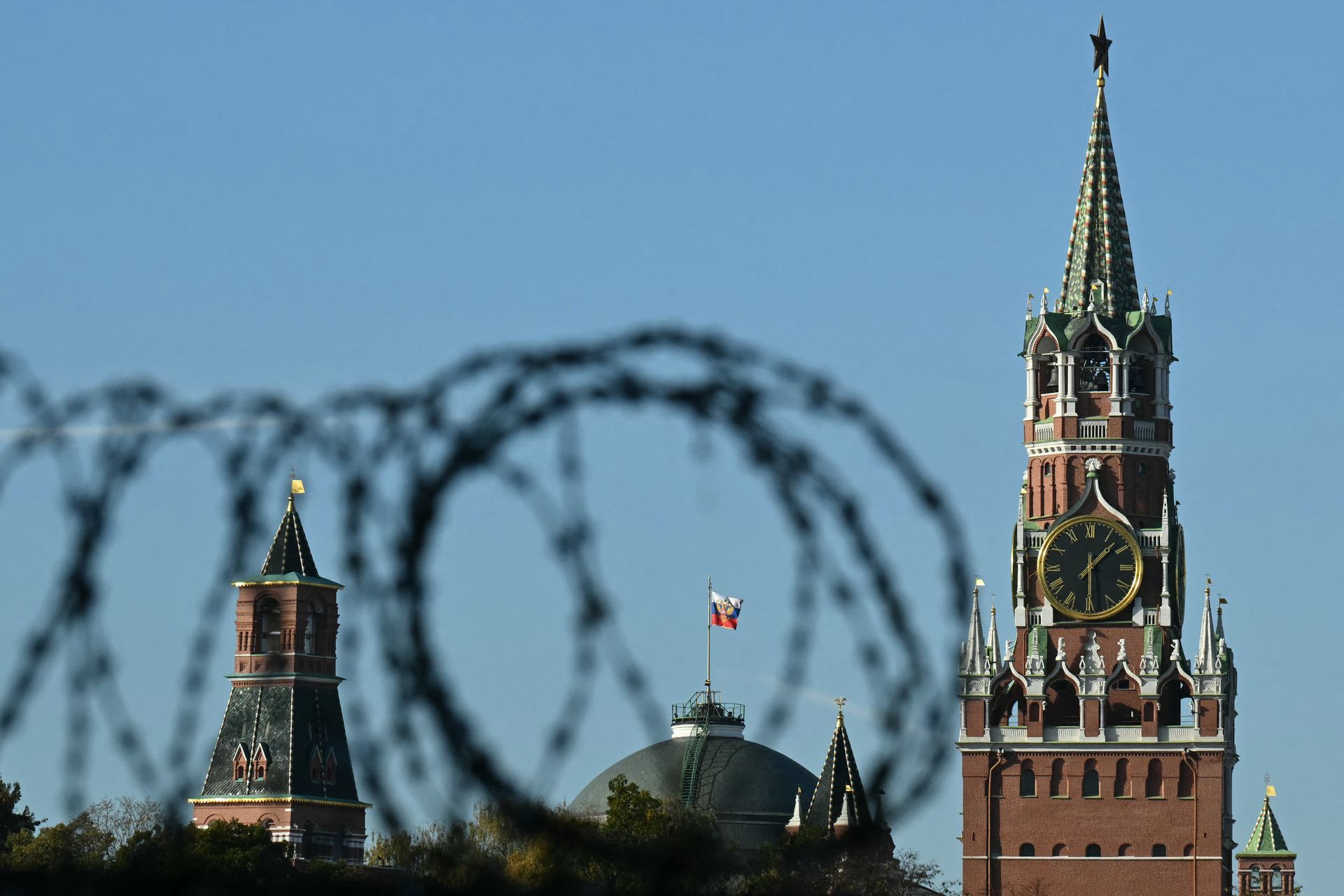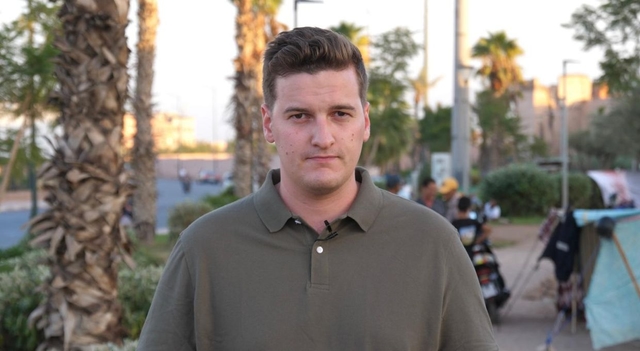'It's a mess' — after all the hype, Ukraine-Russia peace talks in Istanbul descend into name-calling shambles

President Volodymyr Zelensky speaks to the media after meeting with Turkish President Recep Tayyip Erdoğan in Ankara, Turkey, on May 15, 2025. (Serdar Ozsoy / Getty Images)
TURKEY — Istanbul — it’s where Asia meets Europe, but as we now know, not where Ukrainian President Volodymyr Zelensky will meet Russian President Vladimir Putin.
The world's media descended on the Turkish city on May 15, primed for something potentially historic — the first direct talks between Kyiv and Moscow in three years, amid an international push to reach a full, 30-day ceasefire.
Instead, reporters and correspondents were left hanging around in the springtime sun, with little to report other than a slanging match between the two country's foreign ministries.
"This is a negotiating farce," Hanna Hopko, co-founder of the International Center for Ukrainian Victory, told the Kyiv Independent. "It's already clear that Putin is just mocking (U.S President Donald) Trump."
The talks in Istanbul were Russia's idea, proposed by Putin on May 11 in yet another attempt to distract from the fact that after exactly two months, the Kremlin is still refusing to agree to the full, 30-day ceasefire that Trump originally called for.
The Ukrainian position was clear from the beginning — Zelensky immediately said he was going to Istanbul and expected to see Putin there, a move which appeared to catch the Kremlin off-guard and stun it into a days-long silence as it contemplated its next move.
Upping the pressure further, Trump on May 12 said he believed that "both leaders" will be there, thrusting Putin into a delicate diplomatic dilemma — how to avoid caving into Zelensky's proposal without upsetting Trump.
The 'sham delegation'
After days of consideration, Putin decided the best option was to just not show up and not give an explanation, the news coming late in the evening of May 14 in the form of a list of names of those who would be representing Russia in Istanbul.
As well as omitting Putin's name, the list also lacked those of any Russian ministers or high-ranking officials, setting the tone for the following day and giving a clear indication of how seriously the Kremlin was taking the very talks it proposed itself.
"Putin was not ready for any fair peace talks," Mykola Kniazhytskyi, a Ukrainian lawmaker from the European Solidarity party, told the Kyiv Independent. "Russia's strategy is to continue the war as long as possible."
Zelensky decried the Russian representatives as a "sham delegation," highlighting that the Ukrainian delegation was of the "highest level," including Foreign Minister Andrii Sybiha.
The Kremlin was not pleased.

"Who uses the word 'sham'? A clown, a loser, a person with no education at all," Russian Foreign Ministry spokesperson Maria Zakharova seethed during a press briefing.
Ukraine hit back, with Foreign Ministry spokesperson Heorhii Tykhyi saying it was "not the first time the Russian Foreign Ministry became a laughing stock."
"It is also worth noting that the delegation in Turkey is not led by the Russian Foreign Ministry — their role is to bark from Moscow," he added.
Instead of Putin coming to meet with President @ZelenskyyUa in Türkiye and have a serious conversation about ending the war and restoring peace, what we hear from Russia are personal insults of the Ukrainian President.
— Heorhii Tykhyi (@SpoxUkraineMFA) May 15, 2025
Not the first time the Russian foreign ministry becomes a…
The Trump response
Despite the rhetoric and the glaring absence of Putin in Istanbul, Trump appeared to let the Russian president off the hook for not attending.
"I didn’t think it was possible for Putin to go if I’m not there," he said during a visit to the United Arab Emirates on May 15, later telling reporters: "Nothing's going to happen until Putin and I get together."
"Trump is already acting as Putin's lawyer. It's humiliating, it's a shame."
For the journalists in Istanbul, many of whom had been in Antalya for the NATO foreign ministers meeting and then diverted for the talks, it was just about the biggest news of the day.
In Kyiv, it sparked huge frustration.

“America is losing its credibility," Hopko, said, adding: "Trump is already acting as Putin's lawyer. It's humiliating, it's a shame."
"The worst part of all this is that when Russia is vulnerable, when its economy is cracking, instead of pushing harder, (the West is holding back)," she added.
"Putin will agree to talks and come to the negotiation table only when he’s cornered — when he understands that the West has a united front with serious plans."
Kniazhytskyi said Putin was simply trying — and succeeding — to keep Trump onside, hoping "the opportunities to make money together with Putin will be more important to him" in the long run.
Others were even more blunt. "It's a mess," Oleksandr Merezhko, a Ukrainian lawmaker and chair of the parliament's foreign affairs committee, told the Kyiv Independent.
Outside of Kyiv, seasoned Ukraine-watchers questioned just how viable Putin's strategy is in the longer term.
"What is interesting here," Ambassador Kurt Volker, a former U.S. special representative for Ukraine, told the Kyiv Independent, "is that the spotlight keeps getting brighter on Putin."
"The U.S., Europe, Ukraine all call for ceasefire, Putin then says negotiate. The U.S. and Ukraine say OK, let’s negotiate, and then Putin is a no-show. I don’t know how much longer this can go on."
The 'trap'
Hopko, Kniazhytsky, and Merezhko all warned of what the latter described as a "trap" being laid by the Kremlin both on May 15, and in the days leading up to it — the setting of a benchmark for negotiations based on those it set at the last talks held in the early months of the full-scale war in 2022, which amounted to Ukraine's full capitulation.
"Putin wanted to turn this into a continuation of (the 2022 talks) and that's why he sent (his aide Vladimir) Medinsky, who was at (the 2022 talks), to put forward all the same demands," Kniazhytsky said.

Leaked copies of Russia's demands at this time show that in 2022 Moscow was demanding Ukraine reduce its army to 50,000 people, five times less than the country had before the all-out war, as well as reduce the number of ships, helicopters, and tanks.
Russia also planned to ban Ukraine from developing "any other types of weapons as a result of scientific research, and not to produce, acquire or deploy in Ukraine missile weapons "of any type with a range of more than 250 km."
As well as leaving Ukraine defenseless, Russia now insists that, as a condition for peace negotiations, Ukrainian troops must leave the country's Donetsk, Luhansk, Kherson, and Zaporizhzhia oblasts – all four of which Russia partially occupies – recognize Russia's annexation of Crimea, and abandon any ambition to join NATO.
The second day of talks
On the evening of May 15, journalists in Istanbul found out they'd likely have to wait at least another day for anything concrete to come from the talks which, at the time of writing, had yet to even begin.
After a diplomatic stand–off of sorts, Zelensky sent a Ukrainian delegation led by Defense Minister Rustem Umerov to Istanbul from Ankara to demonstrate Ukraine’s commitment to peace. Zelensky said the delegation’s top priority would be reaching a ceasefire agreement.

Russia's low-level delegation awaits them.
Ukrainian, U.S., and Turkish delegates met in Istanbul on May 16 for a trilateral meeting, and Ukrainian, Russian, and Turkish officials will hold trilateral talks at 12:30 p.m. local time.
What those talks will lead to is anyone’s guess — skeptics will say they are probably just for show. Nevertheless, they are historic, at any level.
Russia has said their delegation is in a constructive mood, though what that actually means remains unclear.
But based on what we have seen so far, Zelensky is taking a step toward peace, while Putin refuses to step out of Moscow.












